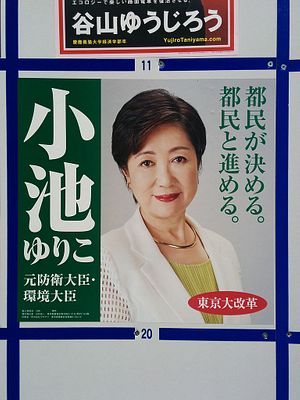Yuriko Koike made headlines last summer when she was elected the first female governor of Tokyo. The former TV announcer, who speaks Arabic and English, had burnished her credentials as an outside reformer by running against – and beating – the Liberal Democratic Party (LDP)-backed candidate in that race to govern the 13.6 million people of Tokyo. She ran on an anti-establishment platform and good governance pledge, a message that resonated especially well in light of the fact that her two predecessors had quit over scandals.
This summer, on June 1, she officially offered her resignation to the LDP to take the helm of her fledgling party, Tomin First no Kai (literal translation: Tokyoites first group), a regional political party. She took the initiative to cut ties with the LDP, which had been dragging its feet on deciding what to do about her membership, and sources have told the Yomiuri Shimbun that they expect her resignation to be accepted. Koike had been de facto leading Tomin First, but now she will likely begin taking a more confrontational stance against the LDP as she prepares for the upcoming Tokyo Metropolitan Assembly elections on July 2.
Though it is too early to tell which way the election will go – official campaigning does not begin until June 23 – it is clear that there is heightened interest in this year’s metropolitan election compared to the last one in 2013: the percent of those “very much interested” and “somewhat interested” went up by 10 percent to 83 percent.
Koike has a 69 percent approval rating, and 53 percent of respondents said they “had expectations” for Tomin First, compared to 36 percent who did not.
Yomiuri’s survey found that 25 percent of respondents planned to vote for LDP candidates, with Tomin First only three points down at 22 percent. Tomin First will be the wild card in this election, as not only do 22 percent of respondents with no particular party affiliation support it, but 23 percent of LDP supporters and more than 20 percent of Democratic Party (DP, the main opposition party in Japan) supporters back the new party as well.
Due to this popularity, Tomin First is considering fielding more than 60 candidates, which together with wins by Tomin First-friendly parties would be enough to make a play for the majority in the 127-member metropolitan assembly. Earlier, Tomin First had floated the idea of fielding 30 to 40 candidates, but their calculus changed when a Koike-backed candidate decisively won the mayorship of Chiyoda Ward in early February. Masami Ishikawa, Koike’s pick, won more than 16,000 votes, or more than triple the number of ballots cast for his competitors, including a candidate supported by the LDP.
The main challenge for whichever party wins a majority of seats in the assembly will be the issue of relocating the Tsukji wholesale market and preparations for the 2020 Olympics. Soon after her election, Koike postponed Tsukiji’s relocation from its 80-year-old location along Tokyo Bay to the manmade Toyosu island, due to concerns about soil contamination.
Koike has denied being interested in the premiership, but speculation is increasing that she will seek national leadership. She has held high-level government positions in the past, including a stint as environment minister (2003-06) under former Prime Minsiter Koizumi Junichiro, and as defense minister (2007) during Shinzo Abe’s first stint as prime minister.
Significant hurdles would remain, however, should she choose to pursue this path. Abe, of course, has a vested interest in whom he will pass on his legacy to, and his favorite is the current defense minister, Tomomi Inada – another rising female star. Other politicians are unlikely to stand by quietly either; Shigeru Ishiba, the perennial challenger, is making moves to challenge Abe again.
If it is too early to predict the Tokyo election outcomes on July 2, it is of course too early to predict what will happen in 2021 – when Abe must step down after serving his third consecutive term as LDP president (if he lasts that long). But the political import of the 2020 Olympics only continues to rise, as Koike’s fate hangs on how she manages this complex policy challenge in the global spotlight.

































